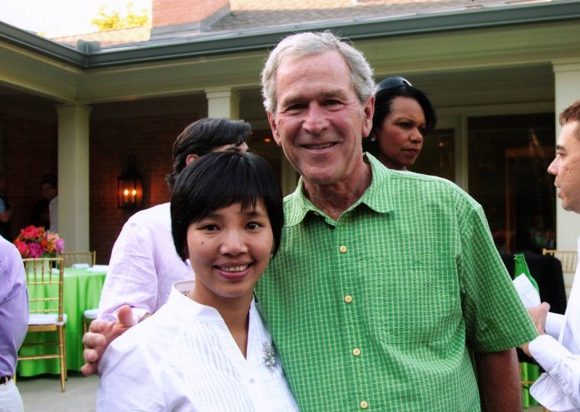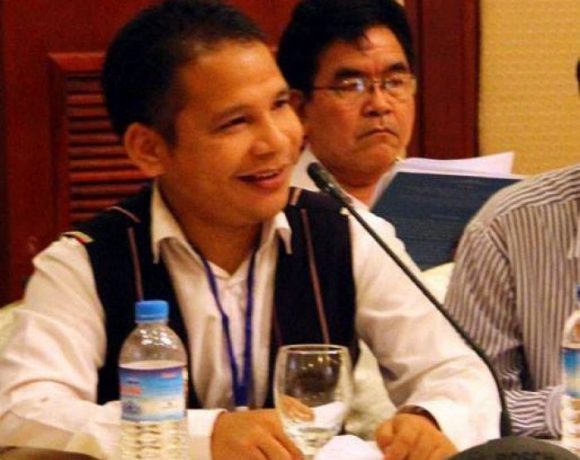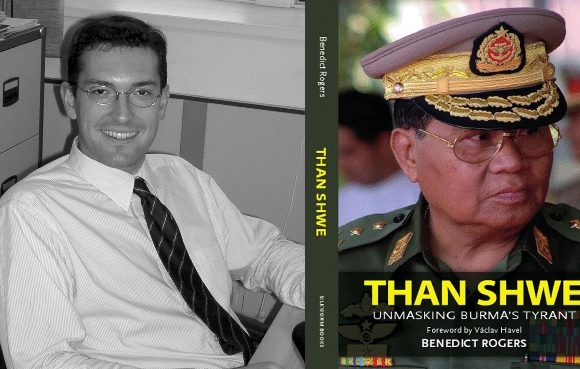Interview With Salai Kipp Kho Lian
Hamburg 3 May, 2002
Chinland Guardian: Thank you for giving us an opportunity to interview you.
Salai Kipp Kho Lian: You are welcomed and let me first of all make clear that the contents of this interview will be my personal views – which should not necessarily reflect policies of any organization I am involved with.
Chinland Guardian: We have seen your posting, in the name of Chin Forum Information Service (CFIS), regularly in the internet. Can you please tell us the nature of that information networks?
Salai Kipp Kho Lian: It is not a discussion group. That means only the moderators can post messages. All other members participate as subscribers, but could not directly send messages to each other or to the CFIS. So the CFIS is announcement-only type of one way news sharing group. The moderator of this CFIS is Salai Ngun Cung Lian, (USA) who occasionally posts information though I, as the co-moderator, send information to the group regularly.
Apart from the CFIS we also have Global Chin Commuinty Mailing List [email protected] – which is unmoderated, all subscribers can post messages as they wish, uncensored by the moderator. The moderator is Piang Lilian (Australia).
Both the CFIS and the GCCML belongs to the Chin Forum and managed under the Chin Forum Working Group II of which I serve as the convener.
Chinland Guardian: Could you tell us something about the Chin Forum?
Salai Kipp Kho Lian: The Chin Forum is an offshoot of the First Chin Seminar held on April 29 –May 2 1998 at Ottawa. It aims to provide a common forum for all the Chin. The Forum also carry out various tasks of research and documentation works for the betterment of the entire Chin people under six working groups namely Working Group for Drafting Constitution for the future Chinland (WGI), Working Group for Communication and Information (WGII), Working Group for Education (WGIII), Working Group for Economic and Development (WG IV), Working Group for Health (WGV) and Working Group for Historical Research and Cultural Preservation (WGVI).
So the Chin Forum is not a political party but an institution without affiliation to any political organization; a forum open to all Chins of different political views or affiliations interested in working together for unity and common democratic objectives.
Having its seat at Ottawa the Forum is managed by the Chin Forum Management Body made up of conveners of each working groups and other selected participants of the Forum scattered across the globe. The CFMB has a Secretary and a Joint-Secretary in Canada and Australia respectively.
Chinland Guardian: During the Second Chin Seminar in Delhi, many people praise your ability to lead and control the mass. It is said that the success of the Second Chin Seminar in New Delhi (February 2000) was because of your intelligence. What is/are the significant issues during that Chin Seminar?
Salai Kipp Kho Lian: I may have played some role during the Seminar but it would not be appropriate to attribute the success of the Second Chin Seminar to a single person. The successful convening of the Seminar was due to the collective leadership of those members of the Chin Forum Management Body and other leaders who were present during that time and more importantly the commitments and willingness of all participants to uphold the unity. The main issue at the beginning of the Seminar was that some sections of our community, especially our southern brothers, felt that the Chin Forum was not a true Forum for all Chins as they were not being invited to the First Chin Seminar. Their demand for forming a true Forum was quite fair and acceptable so after heated debates for almost two days we managed to reform the CFMB to the satisfaction of the majority of the participants.
Throughout the Seminar as we discussed about the tasks of each working group, even though the participants were no less enthusiastic on discussions of the tasks of other working groups of the Chin Forum we noticed – and the poll conducted thereafter also indicated – that the Initial Draft of the Chinland Constitution received the most attention and enthusiasm.
Chinland Guardian: Do you think the Chin Forum is a true forum for all Chins?
Salai Kipp Kho Lian: Yes, I would say so but it is not without imperfections. To manage its various tasks the Forum heavily depends on the Internet. So by nature it is a cyber Forum, though the CFMB conducts occasional physical meetings when necessary and when finance is available. The Forum answers to the Chin Seminar, which has the highest authority. Due to lack of budget we could not yet convene another Chin Seminar now for two years. If budget would be readily available and the Seminars could be convened once a year we could have more interactions with people with diverse opinions heavily concentrated in India and have better chance to solidify all Chin democratic forces in line with the Forum’s policy and at the same time more effectively enhance our image as a genuine forum of the Chins.
Nevertheless, even with its present limitations facing the Chin Forum I believe it is a true forum of the Chins people of different opinions and political affiliations are working together under this Forum. So naturally, like any other organizations, the Forum is not immune to internal conflicts but what I treasure most is that we always manage to channel these conflicts or differences to promote growth and positive changes for gaining a more mature stage – a genuine forum for all Chins. It will take sometime but the Forum will eventually evolve to the stage of full maturity in due course.
Anyway, the Chin Forum with its imperfections is what we could have within all the limitations. If it has its weaknesses I could not see any better alternative, at least at this moment.
Chinland Guardian: Going back to the campus, and political movement under the Burmese Socialist Program Party BSPP, it will be great to hear your political life under the BSPP. Would you mind to tell us that?
Salai Kipp Kho Lian: It would be a long and boring story to go into detail. But if I’m to make it short the political trainings that I received at the notorious Insein Jail for two times have been quite valuable. Ironically I need to thank the BSPP regime for giving me such an opportunity so that I got to know some old hand politicians and student activists from various university institutes from whom I learned a lot about politics and tactics of urban underground movements.
Chinland Guardian: Could you tell us at least the reasons behind your arrests at that time (in Burma)?
Salai Kipp Kho Lian: As one of the signatories of the “Proposals of the Chin Youth” put up to the military regime demanding democracy and federal system for the country I was arrested along with about 60 Chin elders and leaders. The paper was prepared by the Chin students under the leadership of Pu Lian Uk and Pu Cin Sian Thang in response to the regime’s call for advice (1968/69) for the new constitution of the country. At the end of 1972 the regime started arresting politicians who were mostly from ethnic nationalities. The Burmese dictators apparently believed those arrested to be potential opponents to their own version of the constitution. We were released in January 1974 after the constitution drafted by the BSPP had been promulgated.
In December the same year U Thant, the ex-General Secretary of the UN, died in the USAand his remains was flown back to Rangoon from New York according to his wish. In defiance to the regime’s arrangement for a normal funeral for him the students took the casket to the campus and staged a demonstration demanding a state funeral and a monument for U Thant. I was arrested along with about 3000 students in the campus when the Army brutally crushed the demonstration.
Chinland Guardian: For many Chin patriots and youth, especially university students ( including myself), ” Rhododendron Land Awaken” is the most admired song ever. Is “Rhododendron Land Awaken” more than a song as many Chin patriots portrayed?
Salai Kipp Kho Lian: Thank you for your compliments but I have no idea if it is more than a song. In fact it was composed as a song to awaken the new generations. Actually the song was co-composed by Salai Ram Ling Hmung. The lyric, at its core, was a merger of two contrasting metaphors: the heart-shaped-peaceful “Rih Lake” and the rough-roaring “Manipur River”. The first metaphor- symbolizing our peace-loving nature (our hearts) being the obsession of Salai Ling and the later mine – depicting the sufferings and hard life endured by our people. The tune was composed by Salai Thua Aung.
Chinland Guardian: Do you belong to any political party at present? How is your relationship with them?
Salai Kipp Kho Lian: I do not belong to any political party and I wish to remain as such for the rest of my life. I do not have intimate relationships with any political party though occasionally I have contacts with our political leaders.
Chinland Guardian: You have sacrificed your whole life for restoration of human rights and democracy in Burma. Why don’t you get involve in any political party and organization? And could you also tell us in what kind of organizations you are involved with apart from the Chin Forum and the respective portfolios you are holding?
Salai Kipp Kho Lian: Apart from the Chin Forum, I was involved in the formations of some organizations like the Burma Büro (Köln), European Burmese Association (Hamburg) and the Chin Community (Germany) in which I am presently a member of the BB, Chairman of the EBA and a member of the Advisory Board of the CCG. I had served as Ethnic Coordinator under the Burma Büro for four years before. None of these is political party but formed with the aims of helping the Burmese struggle for freedom and democracy. I enjoy working under these organizations.
As a non-partisan, I can more freely support or criticize the works and policies of any political parties and I wish to maintain this freedom. Moreover, from the onset when I got involved with politics back home I have had no political ambition. So I support any leader or party on the basis of whether they deliver the wishes of our people rather than supporting one party over the other.
Chinland Guardian: These days, the term ” Unity” is widely used by many. What is your view in terms of “unity” among the Chins? What would be your suggestion to achieve or maintain unity among the Chins?
Salai Kipp Kho Lian: The main issue I am genuinely concerned with is the killings of innocent civilians by the CNF soldiers. Regardless of the reasons behind these killings it creates animosity among our community which is not good for our future. Through friends who have close relationships with the CNF leadership I have urged them (the CNF) to stop the killings. There are other issues like the nomenclature, for instance, and who or which organization should represent the Chin people etc. and the different interpretations of the term “unity” among Chin organizations.
Given the controversial issues surrounding the Chin’s struggle for freedom and democracy at this moment, there is one area I can think of where all political parties and individual activists could work together in unison is drafting the Constitution of the future Chin State. At this moment the Chin Forum WG I is doing the job and it is about to release the latest draft to all political parties and interested individuals for feedback. If all our leaders could sit together and work out on this task regardless of their differences we all could focus our attention on a single destination – a common goal. This will pave the way for bringing our people closer in our struggle for freedom and democracy.
This task of Drafting the Constitution of the future Chin State could not be confined to the Chin Forum alone. All parties and interested individuals need to work together regardless of their differences.
Chinland Guardian: Lets go a little bit further in search of Unity. War is always follow by casualties. And there is war, civil war, in Burma. The Chins are now fighting against the SPDC like other nationalities in Burma. As long as there is a Chin armed resistance movement, there will be casualties. Is Chin people’s “unity” one of the casualties caused by the war against SPDC?
Salai Kipp Kho Lian: No war could ever be fought without casualties of combatants or non-combatants alike. But we are not having any kind of war – be it conventional or guerilla type – in Chin State, though occasionally we are informed about some skirmishes between the SPDC and the CNF troops. Armed resistance movements in Burma or elsewhere do not always automatically unite the oppressed people. It usually takes time to reach a mature stage. I consulted friends from other ethnic groups to acquire their past experiences as regard to killings of civilians by armed revolutionary organizations. To my surprise all those friends from different areas echoed the same remark uniformly: “Killing civilians are things of the past in our area. The Chin armed resistance movements should take lessons from our past mistakes, in this way you could reach the mature stage much faster than it had taken for us”.
Chinland Guardian: Could you tell us about your assessment on the the Paite – Kuki incineration of 1997 in Manipur State?
Salai Kipp Kho Lian: It was a war between brothers or outright genocide and I think it will be remembered for a long time as one of the most tragic and darkest moment of our entire history. It was estimated to have caused casualties of around 500 civilians along with combatants. However, it is most important for all of us to keep in mind the fact that the warring factions have striked a peace deal and they have even managed to form up a united front.
This positive factor should not be ignored in our assessment to this tragic incident.
Chinland Guardian: Do you have any advice for our political organizations?
Salai Kipp Kho Lian: With due respect to our leaders and for fairness’ sake I would prefer face to face discussions with them on many issues concerning the Chin struggle instead of giving a one-sided and unsolicited advice. But there are somethings I could say without the risk of being taken as unfair or one-sided.
1. Our armed groups, especially the leaders of the CNF, should pay more attention to complaints from their critics. Ignoring these complaints and failure to address them seriously will only multiply the tensions within the community.
2. At the eastern front more and more co-operations are taking place among our ethnic brothers, regardless of whether they are cease-fire groups, members of NDF or not. Our armed groups at the western front should follow the same example.
Shortly after the Behiang incident Pu Do Lian, the Chairman of Chinland Development and Research Committee of Sweden, initiated a proposal to host a meeting of our armed groups in Sweden. At the request of Pu Do Lian I contacted the concerned leaders. Both Pu Thang Lian Pau of ZRO and Pu Khai Mang of KNO agreed with the proposal while the CNF leadership preferred such meetings between themselves somewhere in Manipur. A meeting between the CNF & ZRO, indeed. took place in Manipur. Again at the end of 2000 when Pu Dr. Ro Ding proposed a meeting between ZRO and CNF leadership in Shillong with Dr. Vum Son, Dr. Ro Ding and I, myself to act as mediators the idea was turned down by the CNF without giving any specific reasons.
We are not supposed to interfere in their affairs but what we wish to see is at least a kind of regular meetings to be conducted among our armed groups even if they could not form up a united front.
Chinland Guardian: Thank you for your time.
Salai Kipp Kho Lian: I thank you, too, for giving me this opportunity to speak out what I have in my mind.






